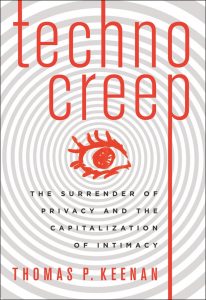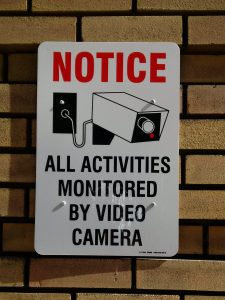A new global privacy initiative, sponsored by Canada’s federal privacy commissioner, calls on governments, businesses, legislators, and users to embrace and protect privacy as an important right with social value in and of itself.
Daniel Therrien is one of some 80 privacy officers and commissioners from around the world calling for an update to and strengthening of their countries’ privacy and data protection laws.
And while they did not use the term, the notion of “ambient privacy” is one that aligns well with their initiative.
Ambient privacy advocates say there is a value in not being monitored on a daily basis. That the very notion of individuality may lie in the fact that “the small details about our lives should pass by unremembered.”
But that’s a far cry from the privacy environment that’s currently evolving.
Therrien and his Office of the Privacy Commissioner of Canada are among those responding to growing citizen concerns over the use of personal information and data: the vast majority (92 per cent) of Canadians have expressed “some level of concern about the protection of privacy” according to a 2018-2019 survey conducted by the OPC. People feel they have little or no control over how their personal information is being used, be it online or off, be it by companies or governments or other users.

People feel they have little or no control over how their personal information is being used, be it online or off, be it by companies or governments or other users.
“Privacy plays a vital role in enabling other key rights, such as human dignity, freedom, equality and democracy,” the commissioners’ statement reads.
And while they certainly call on legislators to do their part, passing more robust laws to protect personal information and regulate data usage, they also call on businesses to be accountable in their commercial data-gathering activities and to assess risks to privacy, fairness and freedom before using artificial intelligence in their activities.
Crucially, they also call for citizens themselves to be informed about and actively exert their privacy rights.
For example, we citizens or Netizens need to know about the value of our information in the digital age: huge corporations are making millions of dollars by collecting, handling, sharing or analyzing data – our data!
We need to understand that being judged or categorized or liked or unliked based on a digital data trail that can easily be misconstrued or taken out of context is a real risk to us, as individuals or as social groups.
And make no mistake, that digital data trail is longer and increasing more widely available than we might imagine.
 “Within the first two or three seconds of landing on a website, your data is often shared with dozens of third-party firms,” describes Ray Patterson, a University of Calgary business technology management professor and author of Techno Creep: A Surrender of Privacy and the Capitalization of Intimacy.
“Within the first two or three seconds of landing on a website, your data is often shared with dozens of third-party firms,” describes Ray Patterson, a University of Calgary business technology management professor and author of Techno Creep: A Surrender of Privacy and the Capitalization of Intimacy.
Patterson and Hooman Hidaji, a colleague at UCal’s Haskayne School of Business, have tracked the extent and immediacy with which our data is tracked – and shared – without our knowledge.
Online companies of all sorts are actively assembling a comprehensive history of what websites we visit, for how long and in what order, what purchases we make or content we view while there, and so on. Browsing history is one thing, but other digital identifiers can record the type of device we use, its – and therefore our – location, and what we are doing with it on a minute-by-minute basis. That’s our digital ambience.
The data in that environment is valuable not just to for-profit companies which offer online services or product purchase opportunities; the collected and collated data can also be used for social and political influence.
In spite of the social and commercial pressures to give up our data at every click, we have a right to expect privacy and control over our information whether we are sitting at our computer, handling our smartphone or even being out and about!
In an interesting and impactful decision from Canada’s Supreme Court, we should expect some level of privacy even when we are in public!
In public areas where surveillance technology is in use (uhh, that’s a long long list), Canadians do have a right to a reasonable expectation of privacy, judges ruled in a case known as R. vs. Jarvis.
The ruling is another recognition of what our ambient environment really looks like today – covered not just figuratively in the online sense but quite literally in the physical world by surveillance systems and structures of all shapes and sizes.

All activities? Real-world surveillance systems and online data collection tools may get too much information for their own good – seemingly, too much for our good, too.
But, says Maciej Ceglowski, “[w]hat we do at home, work, church, school, or in our leisure time does not belong in a permanent record.” Ceglowski is a web developer, tech activist and founder of a group called Tech Solidarity, out of San Francisco. He calls for “the understanding that there is value in having our everyday interactions with one another remain outside the reach of monitoring.
“Not every conversation needs to be a deposition.”
Think about it this way: nowadays, it can be really awkward when a friend or acquaintance shares too much detail about something that happened to them – it’s TMI, too much information.
In ancient times, as described in the Hebrew Bible and the concept of s’tam b’nei adam, neighbours who have no reasonable expectation that a loud voice won’t carry through walls that are too thin, for example, should speak softly, both to protect their own privacy but also to respect the rights of the folks on the other side of that wall.
One could see that as an environmental concern as much as a privacy concern. We want an environment with good air and water, so why not with personal privacy and social security.
Sure, assessing today’s unique privacy controversies in the context of yesterday’s broad religious pronouncements may not resonate.
But seeing privacy as a kind of natural resource brings the discussion right up to date. Our natural environment is in jeopardy, and millions of people around the world are demanding corrective action as a result.
Ceglowski says we should see privacy in much the same way – it is a valuable natural resource worth protecting, an existential asset that must not be lost.
He reminds us that we have moved from once seeing nature as an inexhaustible resource, there for the picking, to now seeing it as an integral part of our own survival that needs nurturing.
The privacy environment is much the same.

“Privacy plays a vital role in enabling other key rights, such as human dignity, freedom, equality and democracy,” says a group of international privacy commissioners. Sounds a bit like good clean air.
-30-




Yes, thank you, Karen
My mistake: The University of Calgary’s Thomas P. Keenan is the author of Techno-Creep, as the book cover pictured above clearly shows. UCalgary’s Ray Patterson et al wrote a report entitled How Much to Share with Third Parties? User Privacy Concerns and Website Dilemmas. Apologies for any confusion this mix-up may have caused.
The author of Techno Creep is another professor at the University of Calgary. Dr. Ray Patterson, PhD is not the author of Techno Creep.